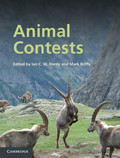Book contents
- Frontmatter
- Contents
- List of contributors
- Foreword
- Preface
- Acknowledgements
- Abbreviations
- 1 Introduction to animal contests
- 2 Dyadic contests: modelling fights between two individuals
- 3 Models of group or multi-party contests
- 4 Analysis of animal contest data
- 5 Contests in crustaceans: assessments, decisions and their underlying mechanisms
- 6 Aggression in spiders
- 7 Contest behaviour in butterflies: fighting without weapons
- 8 Hymenopteran contests and agonistic behaviour
- 9 Horns and the role of development in the evolution of beetle contests
- 10 Contest behaviour in fishes
- 11 Contests in amphibians
- 12 Lizards and other reptiles as model systems for the study of contest behaviour
- 13 Bird contests: from hatching to fertilisation
- 14 Contest behaviour in ungulates
- 15 Human contests: evolutionary theory and the analysis of interstate war
- 16 Prospects for animal contests
- Index
- References
Preface
Published online by Cambridge University Press: 05 June 2013
- Frontmatter
- Contents
- List of contributors
- Foreword
- Preface
- Acknowledgements
- Abbreviations
- 1 Introduction to animal contests
- 2 Dyadic contests: modelling fights between two individuals
- 3 Models of group or multi-party contests
- 4 Analysis of animal contest data
- 5 Contests in crustaceans: assessments, decisions and their underlying mechanisms
- 6 Aggression in spiders
- 7 Contest behaviour in butterflies: fighting without weapons
- 8 Hymenopteran contests and agonistic behaviour
- 9 Horns and the role of development in the evolution of beetle contests
- 10 Contest behaviour in fishes
- 11 Contests in amphibians
- 12 Lizards and other reptiles as model systems for the study of contest behaviour
- 13 Bird contests: from hatching to fertilisation
- 14 Contest behaviour in ungulates
- 15 Human contests: evolutionary theory and the analysis of interstate war
- 16 Prospects for animal contests
- Index
- References
Summary
This book is about the evolution of contest behaviour in animals. It covers both predictive theories for contest evolution and empirical evidence. There are several potential strategies for organising an edited book that collects together a diverse range of study systems and a rich body of theory. One would have been to invite authors to each write a chapter about their favourite concept. For example, there are several alternative theoretical explanations (models) for contestant assessment during agonistic interactions that appear frequently in the contest literature (these are introduced in Chapter 1 and detailed in Chapter 2) and MB, along with several other contributors to this volume, has been especially interested in using a particular study-species to test the key features of these models in order to investigate assessment rules and the possible functions of repeated agonistic signals. In other words, we are all interested in how the loser makes the decision to give up, and could each have contributed a chapter along similar lines, covering the relevant theory as well as detailing our own experiments. It soon became apparent, however, that there was a potential cost associated with this layout: as a result of the tight links between theory and experimental work described above, many authors would have wanted to write about the same concepts, albeit applied to different animals, leading to much conceptual repetition between chapters.
Our alternative, and adopted, strategy for organising this book has been to divide it into two main sections, the first dealing with general theory and the second comprising a series of chapters arranged by taxon (in the somewhat uncomfortably traditional ‘invertebrates to humans’ sequence). The link between the theoretical and empirical sections is a chapter on analysis of contest behaviour data. This includes recent advances in our understanding of the appropriate experimental design and analytical approaches for testing hypotheses about contest behaviour, with the aim of providing practical advice to those engaged in empirical contest research. As we see it, this scheme has two main advantages.
- Type
- Chapter
- Information
- Animal Contests , pp. xxi - xxiiiPublisher: Cambridge University PressPrint publication year: 2013
References
- 2
- Cited by



